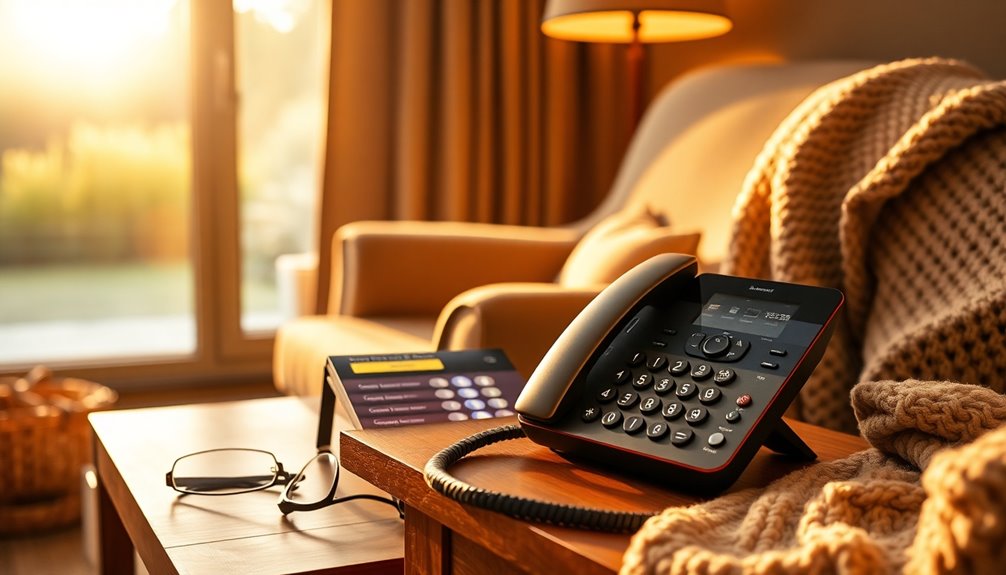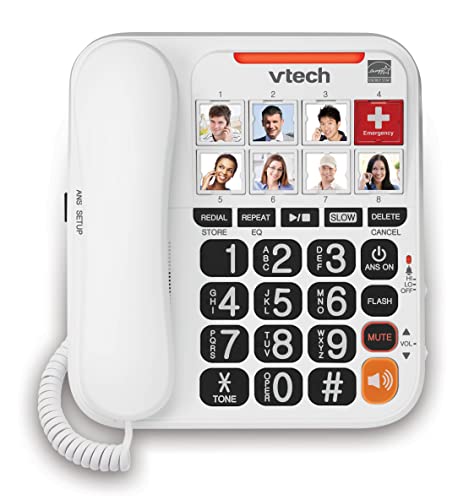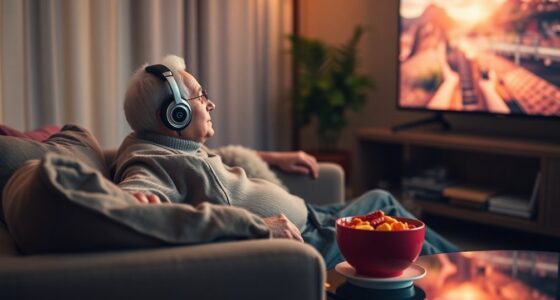If you’re looking for the best landline phones for elderly users, you’ll want options that prioritize ease of use and clear communication. Phones with large buttons, amplified sound, and intuitive features—like photo memory keys and smart call blockers—make a real difference. Models like the AT&T BL102-2 and the VTech SN5147 are excellent choices. These devices not only simplify calling but also enhance security. Stick around, and I’ll share more top picks to help you find the perfect fit.
Key Takeaways
- Look for large displays and oversized buttons to enhance visibility and ease of use for seniors with visual or dexterity challenges.
- Select landline phones with amplified sound options to ensure clearer conversations and adjustable volume levels for noisy environments.
- Consider models with smart call blocking features to prevent unwanted robocalls and enhance call management for peace of mind.
- Opt for phones with photo memory keys and SOS features, simplifying emergency dialing for seniors with memory difficulties.
- Ensure the phone is lightweight and portable, allowing seniors to easily handle and carry it around the house for better accessibility.
AT&T BL102-2 DECT 6.0 Cordless Phone with Answering Machine
The AT&T BL102-2 DECT 6.0 Cordless Phone with Answering Machine stands out as an excellent choice for elderly users, primarily due to its user-friendly features, like the large 2-inch display that boasts high-contrast text. I love how easy it is to read, especially in low light thanks to the lighted keypad. Its long-range capabilities mean I can roam freely without losing connection. The smart call blocker helps me avoid those pesky robocalls, and the digital answering machine makes sure I never miss important messages. Overall, it’s a reliable and straightforward phone that truly enhances communication for seniors.
Best For: The AT&T BL102-2 DECT 6.0 Cordless Phone is best for elderly users seeking a user-friendly and reliable communication device.
Pros:
- Large 2-inch high-contrast display for easy reading.
- Smart call blocker to prevent robocalls.
- Long-range capabilities for uninterrupted communication.
Cons:
- Complicated setup process may be challenging for some users.
- Issues reported with the effectiveness of call blocking.
- Difficulties accessing the directory have been noted by some customers.
Ooma Telo VoIP Home Phone with 3x HD3 Handset, Black (TELO3HD3)
If you’re looking for a reliable landline phone that caters to the needs of elderly users, the Ooma Telo VoIP Home Phone with three HD3 handsets is an excellent choice. This system offers crystal-clear nationwide calling for free, and the included handsets feature color screens with picture caller-ID, making it easy to identify who’s calling. The setup is straightforward—just plug the Telo into your modem, and you’re good to go. Plus, with advanced features like call blocking and voicemail-to-email forwarding, it provides added convenience. Overall, it’s a smart investment for better communication at home.
Best For: Those seeking a cost-effective and user-friendly VoIP phone system ideal for elderly users or anyone wanting clear communication at home.
Pros:
- Crystal-clear nationwide calling at no cost, with low rates for international calls.
- User-friendly handsets featuring color screens and picture caller-ID for easy identification of callers.
- Advanced features like call blocking and voicemail-to-email forwarding enhance convenience and security.
Cons:
- Customer service issues reported, particularly concerning credit card entry and 911 service reliability.
- Some users experienced initial setup challenges linked to ISP stability and device upgrades.
- Mixed reviews on the effectiveness of customer support during troubleshooting and setup.
VTech SN5147 Amplified Corded/Cordless Senior Phone
Designed with seniors and the hearing impaired in mind, the VTech SN5147 Amplified Corded/Cordless Senior Phone stands out due to its impressive 90dB extra-loud visual ringer. I love the oversized buttons and large display, which make dialing easy. The smart call blocker is a lifesaver, letting me blacklist unwanted calls while announcing the caller’s name, so I know who’s calling. Speed dialing with attached photos is incredibly convenient, too. While the cordless model can be a bit confusing, the overall functionality enhances my communication experience. This phone truly helps me maintain my independence while keeping me connected with loved ones.
Best For: Seniors and individuals with hearing impairments seeking an easy-to-use phone system that enhances communication and blocks unwanted calls.
Pros:
- User-friendly design with oversized buttons and a large display for easy dialing and visibility.
- Smart call blocker effectively screens unwanted calls and allows for personalized call management.
- Speed dialing with photo attachments enhances usability and helps seniors quickly contact loved ones.
Cons:
- The cordless model may be confusing for some users due to its multiple buttons.
- Average sound quality on the cordless phone compared to the corded option.
- Accidental pressing of the call block button can lead to unintended call blocking issues.
AT&T BL102-2 DECT 6.0 Cordless Phone with Answering Machine
For seniors seeking a reliable and user-friendly communication device, the AT&T BL102-2 DECT 6.0 Cordless Phone stands out with its impressive caller ID announcer feature. I appreciate how it automatically announces who’s calling, making it easier for me to screen calls. The digital answering machine records up to 22 minutes of messages, which is perfect for those important calls I might miss. With a large display and lighted keypad, I can easily dial, even in low light. Plus, the smart call blocker helps me avoid unwanted spam calls. It’s truly a practical choice for everyday communication!
Best For: Seniors seeking a reliable and user-friendly communication device with advanced features for call management.
Pros:
- Large display and lighted keypad make it easy to read and dial, even in low light.
- Caller ID announcer automatically announces incoming calls, simplifying call screening.
- Smart call blocker effectively reduces unwanted spam calls.
Cons:
- Complicated setup process may be challenging for some users.
- Some users report issues with the effectiveness of the call blocking feature.
- Accessing the directory can be difficult for certain users.
VTECH SN1127 Amplified Corded Answering System
The VTECH SN1127 Amplified Corded Answering System stands out as an ideal choice for seniors and those with hearing or vision impairments. I love the 8 photo speed dial keys, which make calling loved ones a breeze. The 90dB ringer guarantees I never miss a call, and the 40dB audio booster helps me hear conversations clearly. Plus, the big buttons are easy to see and use. I appreciate the digital answering system with 22 minutes of recording time. Overall, this phone offers excellent accessibility features, making it a reliable option for maintaining connections with family and friends.
Best For: Seniors and individuals with hearing or vision impairments who need a user-friendly phone system.
Pros:
- Loud ringer volume (90dB) ensures incoming calls are easily heard.
- Photo speed dial keys simplify dialing frequently contacted numbers.
- Big buttons and high-contrast colors enhance visibility and usability.
Cons:
- Limited ringer volume settings may not cater to all preferences.
- Challenges with message retrieval when used with cell phones noted by some users.
- Weight may be slightly cumbersome for those with limited hand strength.
Panasonic Cordless Phone with Large Display and Big Buttons (2 Handsets)
Finding a landline phone that truly meets the needs of elderly users can be a challenge, but the Panasonic Cordless Phone with its large display and big buttons stands out as an excellent choice. With two handsets, it features a large 2.1-inch display and easy-to-read buttons, ensuring visibility is never an issue. The phone also includes handy features like call blocking for robocalls and a built-in flashlight for emergencies. Plus, the volume boost helps with clearer sound. I love how user-friendly it is, making it perfect for seniors who want reliable communication without the fuss.
Best For: Seniors seeking a user-friendly landline phone with enhanced visibility and essential features for reliable communication.
Pros:
- Large display and big buttons improve visibility and ease of use for elderly users.
- Call blocking feature effectively reduces unwanted robocalls and telemarketing interruptions.
- Built-in flashlight provides added safety for emergencies and nighttime use.
Cons:
- Some users may experience difficulty with setup and navigation, particularly those with cognitive impairments.
- The reliance on AAA batteries may require frequent replacements, depending on usage.
- Limited features compared to more advanced phone systems may not meet the needs of tech-savvy users.
Large Key Wired Telephone with Adjustable Volume
When it comes to finding a landline phone that truly meets the needs of elderly users, the large key wired telephone with adjustable volume stands out as an ideal choice. Its oversized keys make dialing a breeze, perfect for those with limited vision. I love that I can adjust the earpiece volume to ultra-high, which is a game-changer for anyone with hearing impairments. Plus, the loud ringer and large warning light guarantee I never miss a call. With two memory buttons for emergencies and a lightweight design, it’s both practical and user-friendly. This phone definitely enhances communication for the elderly!
Best For: This product is best for elderly individuals and those with hearing impairments who require a user-friendly telephone with large buttons and adjustable volume.
Pros:
- Oversized keys facilitate easy dialing for those with limited vision.
- Adjustable earpiece volume to ultra-high aids users with hearing difficulties.
- Loud ringer and large warning light ensure calls are not missed.
Cons:
- Some users report durability issues over time.
- Performance may decline with prolonged use.
- Requires a phone line outlet splitter for simultaneous use with another phone.
SMPL Landline Photo Memory Big Button Phone for Seniors (Model 56010)
Designed specifically for seniors, the SMPL Landline Photo Memory Big Button Phone (Model 56010) features six photo memory keys that make dialing a breeze. I love how easy it is to assign photos to these keys, providing instant connections for family and friends. The large buttons are perfect for my aging hands, and the amplified sound guarantees I never miss an important call. Plus, the visual flasher adds an extra layer of awareness. While setup is straightforward, I wish the wall mount design was better. Overall, this phone boosts my confidence in staying connected with loved ones.
Best For: Seniors and individuals with cognitive decline or dexterity issues who need a simplified and reliable phone for staying connected.
Pros:
- Large buttons and six photo memory keys make dialing easy and intuitive.
- Amplified sound and visual flasher ensure important calls are not missed, catering to users with hearing loss.
- Positive user feedback highlights the phone’s ease of use and confidence it instills in making calls.
Cons:
- Wall mount design lacks recess for common telephone jack plates, complicating installation.
- Some users reported static and echo issues after a few months, requiring a power adapter for resolution.
- Absence of a true speakerphone feature limits convenience for hands-free use.
AT&T CD4930 Corded Phone with Digital Answering System
The AT&T CD4930 Corded Phone with Digital Answering System stands out as an ideal choice for seniors, thanks to its user-friendly features like large buttons and a backlit display. I love how it digitally records up to 25 minutes of messages and offers instant playback. The speakerphone makes hands-free chatting easy, and the volume controls enhance clarity. Plus, the caller ID function allows me to call back quickly. While the directory’s limited to 25 entries, its ease of use and clear audio make it a reliable option for anyone needing straightforward communication. I highly recommend it for seniors seeking simplicity and functionality.
Best For: Seniors and individuals seeking a user-friendly corded phone with essential features for clear communication. This phone is designed to provide simplicity without sacrificing quality, making it an ideal choice for those who prioritize easy access to essential functions. With large buttons and a loud ringer, users can enjoy hassle-free communication, ensuring they stay connected with loved ones. For those seeking more advanced options, exploring the best cell phones for seniors might also offer additional features like emergency alerts and simple apps tailored for their needs.
Pros:
- Large buttons and backlit display enhance visibility and ease of use for seniors.
- Digital answering system allows for up to 25 minutes of message recording with instant playback.
- Speakerphone and volume controls provide hands-free convenience and improved sound clarity.
Cons:
- Limited directory capacity of 25 entries may not meet the needs of users with larger contact lists.
- Directory not sorted alphabetically, which can complicate quick number retrieval.
- Audio assist feature must be activated per call, which can be inconvenient for single users.
Panasonic Amplified Cordless Phone (KX-TGM420W)
For anyone grappling with hearing loss, the Panasonic Amplified Cordless Phone (KX-TGM420W) stands out as an exceptional choice. It boosts call volume up to 40 dB and has a loud base unit ringer that hits 100 dB. I love the six voice tone settings and the Slow Talk button, which makes conversations easier to follow. The large backlit LCD and buttons are perfect for those with low vision. Plus, blocking unwanted calls is a breeze with its 100-number capacity. Overall, this phone really enhances communication, making it a worthwhile investment for better connections.
Best For: Individuals with hearing loss or low vision who need an amplified phone for clearer communication.
Pros:
- Boosts call volume up to 40 dB and features a loud base unit ringer at 100 dB for enhanced sound.
- User-friendly design with a large backlit LCD and buttons, making it accessible for seniors and those with visual impairments.
- Effective call management with 100-number call blocking and speed dial options for easy connectivity.
Cons:
- Some users report dissatisfaction with headset compatibility, limiting its versatility for private conversations.
- Setup may require reading the instruction manual thoroughly to utilize all features effectively.
- Limited availability of additional accessories, which may be a drawback for those seeking more customization options.
Multifunctional Desktop Telephone with Photo Memory Quick Dialing
Offering a lifeline of communication, the multifunctional desktop telephone with photo memory quick dialing is perfect for elderly users or those facing memory challenges. I love how it features nine photo buttons, making it easy to call loved ones with just a press. The adjustable volume and hands-free function guarantee I can hear clearly without hassle. Plus, the SOS emergency call feature adds peace of mind. While some users experienced static issues, many praised its simplicity and effectiveness. Just remember to order from reputable vendors to avoid potential defects. This phone truly helps maintain independence in communication for those who need it.
Best For: This multifunctional desktop telephone is best for elderly users or individuals with memory difficulties who need an easy-to-use communication device.
Pros:
- High-definition sound quality and adjustable volume for comfortable communication.
- Nine photo memory quick dialing buttons simplify the calling process for users.
- SOS emergency call feature provides added safety and peace of mind.
Cons:
- Some users reported issues with static and sound quality over time.
- Concerns about the durability of the lightweight design and potential malfunctions.
- Quality of packaging and product condition can vary significantly between vendors.
SMPL Landline Photo Memory Big Button Phone for Seniors
Simplifying communication for seniors, the SMPL Landline Photo Memory Big Button Phone stands out with its six photo memory keys. I love how I can assign photos to three dedicated memory keys, making it easy to connect instantly. The large buttons are perfect for my mom, who struggles with dexterity. Plus, the amplified sound guarantees she never misses an important call. Setup is a breeze, and I appreciate that it works during power outages. While some users reported static, using a power adapter fixed it. Overall, it’s a fantastic option for enhancing communication for seniors.
Best For: Seniors and individuals with cognitive decline who need a simplified and reliable communication device.
Pros:
- Large buttons make dialing easy for those with dexterity issues.
- Amplified sound ensures important calls are heard clearly, catering to users with hearing loss.
- Photo memory keys allow for instant dialing, simplifying communication for users with memory challenges.
Cons:
- Some users reported static and echo issues after a few months, requiring additional equipment for resolution.
- The wall mount design does not accommodate common telephone jack plates, complicating installation.
- Lack of a true speakerphone feature limits convenience for hands-free communication.
Serene Innovations Amplified Big Button Landline Phone for Seniors
The Serene Innovations Amplified Big Button Landline Phone stands out as an excellent choice for seniors facing cognitive or visual challenges, thanks to its large, easy-to-read buttons and amplified sound. With 26dB amplification and an 85 dB ringer volume, I find it incredibly user-friendly. The one-touch speed dial buttons are perfect for memory assistance, allowing me to program portraits of loved ones. Plus, its corded design means it works even during power outages. Although the speakerphone lacks a visual cue, the overall functionality makes communication easier for seniors like me. I highly recommend it for anyone needing extra support.
Best For: Seniors with cognitive, visual, or auditory challenges who need reliable and easy-to-use communication tools.
Pros:
- Large buttons and intuitive controls enhance usability for seniors.
- Amplified sound (26dB) and loud ringer (85 dB) improve accessibility for those with hearing impairments.
- Corded design ensures phone functionality during power outages.
Cons:
- The speakerphone button lacks a visual cue, potentially confusing some users.
- Programming the memory buttons can be tricky for some individuals.
- No Caller ID feature, which may be a drawback for users expecting this functionality.
Large Key Wired Telephone with Adjustable Ringing Tone and Earpiece Volume
For those who struggle with hearing or vision challenges, a large key wired telephone with adjustable ringing tone and earpiece volume stands out as an ideal choice. I love the oversized keys, making it easy to dial even with limited sight. The adjustable earpiece volume can be cranked up to ultra-high, which is perfect for anyone with hearing impairments. Plus, the loud ringer and large warning light guarantee I never miss a call. It’s lightweight and powered by a telephone line, so I can stay connected even during outages. Overall, it’s a reliable option for better communication.
Best For: Individuals with hearing or vision impairments seeking a reliable and easy-to-use telephone.
Pros:
- Oversized keys allow for easy dialing, making it suitable for those with limited vision.
- Adjustable earpiece volume can be set to ultra-high, aiding individuals with hearing challenges.
- Powered by telephone line, ensuring functionality during power outages.
Cons:
- Some users report durability issues with the product over time.
- Performance problems may arise, affecting long-term reliability.
- Requires a phone line outlet splitter for simultaneous use with another phone, which may add extra cost.
Big Button Phone for Seniors – Corded Telephone with Amplified Ringer
Designed specifically with seniors in mind, the Big Button Phone offers features that cater to those with visual or hearing impairments. I love the large buttons with clear numbers, making it easy to dial without straining. The ergonomic foam handset cover guarantees a good grip, which is perfect for users like me who might struggle with dexterity. The amplified ringer is impressive, reaching over 80 dB, and the flashing light signals incoming calls. With memory keys for quick access to loved ones, I feel secure knowing help is just a button away. It’s lightweight and user-friendly, making it a fantastic choice!
Best For: Seniors with visual or hearing impairments who need a user-friendly telephone solution.
Pros:
- Large buttons with clear numbers enhance usability for visually impaired users.
- Amplified ringer and flashing light provide effective notifications for incoming calls, catering to hearing-impaired seniors.
- Lightweight design and ergonomic handset cover make it comfortable for users with grip difficulties.
Cons:
- Some users reported sound quality issues, including buzzing and low microphone performance.
- The speakerphone volume may be inadequate for certain users.
- The design may muffle sound when the handset is placed back on the base.
Factors to Consider When Choosing Landline Phones for the Elderly

When I think about choosing a landline phone for the elderly, I focus on a few key factors. Ease of use, sound quality, and visual accessibility really stand out to me. Plus, features like call blocking and emergency dialing can make a huge difference in ensuring safety and convenience.
Ease of Use
Choosing the right landline phone for an elderly loved one can make a significant difference in their daily life. I always recommend looking for phones with large, easy-to-read buttons and displays to enhance visibility, especially for those with visual impairments. Amplified sound capabilities with adjustable volume settings are essential for seniors experiencing hearing loss. If memory challenges are a concern, photo memory keys can simplify calling loved ones. It’s also important to choose devices with straightforward setups and intuitive interfaces; this minimizes confusion and promotes independence. Finally, consider phones with clear audio quality and noise reduction features to guarantee conversations are easy to understand. Prioritizing these factors will lead to better communication and a more enjoyable experience.
Sound Quality
Sound quality plays a vital role in ensuring elderly users can communicate effectively and comfortably. When I look for landline phones, I prioritize models with amplification features that boost volume levels by up to 40 dB, which is essential for those with hearing impairments. I also appreciate adjustable volume controls, allowing users to fine-tune sound levels to their needs. Some phones offer noise reduction technology, enhancing call clarity by minimizing background sounds. Additionally, I find speakerphone capabilities invaluable for hands-free conversations, especially for seniors who may struggle to hold a phone. Finally, I like models with visual indicators, such as flashing lights for incoming calls, as they provide an extra layer of support for those with hearing loss.
Visual Accessibility
Effective communication goes beyond sound quality; visual accessibility is just as important for elderly users. When I search for landline phones, I look for models with large buttons and high-contrast colors to help those with visual impairments. A display screen that’s at least 2 inches makes reading caller ID and other information much easier. I also prefer phones with lighted keypads, which are a lifesaver in low-light conditions. Additionally, a visual ringer indicator, like a bright flashing light, alerts users of incoming calls—especially helpful for those who may not hear the ringer. User-friendly features, such as photo speed dial buttons, allow seniors to connect quickly with loved ones without memorizing numbers. It’s all about enhancing their communication experience.
Call Blocking Features
A good landline phone for the elderly should include robust call blocking features to tackle the nuisance of unwanted calls. I’ve found that many modern phones can automatically identify and block robocalls, which is a huge relief. Some models let you blacklist specific numbers, giving you control over who can reach you. Imagine storing up to 1,000 blocked numbers—now that’s peace of mind! Plus, I appreciate handsets that announce caller names, allowing seniors to screen calls effectively. With these features, you can dramatically reduce the frequency of those annoying interruptions, leading to a much more satisfying phone experience. In my opinion, effective call blocking is essential for enhancing communication and preserving daily tranquility. Furthermore, it’s important to choose a phone with a user-friendly interface, ensuring that seniors can navigate the features without frustration. Some brands even offer models specifically marketed as the best call blockers for seniors, prioritizing both ease of use and advanced technology. By investing in such a landline phone, you empower elderly users to maintain their connections without the constant distraction of unwanted calls, fostering a more enjoyable and stress-free communication experience.
Emergency Dialing Options
While call blocking features are important for reducing unwanted interruptions, having reliable emergency dialing options is equally vital for the elderly. I’ve found that dedicated memory buttons can make a world of difference, allowing seniors to reach emergency contacts with just one press. Many landline phones also offer photo memory keys, which help users quickly identify their emergency contacts, especially beneficial for those with cognitive impairments. Additionally, a visual flasher for incoming calls can alert seniors, ensuring they don’t miss important calls. Some models even include an SOS feature that dials pre-programmed emergency numbers automatically. Finally, amplified ringer volumes are essential for catching those urgent calls, particularly for seniors with hearing difficulties.
Amplification Capabilities
Finding the right landline phone with strong amplification capabilities can truly transform communication for elderly users. I’ve noticed that some models offer volume boosts up to 40 dB, making conversations clearer for those with hearing impairments. It’s also essential to look for adjustable ringer volumes that can exceed 80 dB, ensuring incoming calls are heard, even in noisy settings. Features like a Slow Talk button can slow down speech, which helps when dealing with fast-talking callers. I appreciate the visual indicators, such as bright flashing lights, that provide extra alerts for incoming calls. Remember, the effectiveness of amplification can vary, so choose a phone tailored to meet the specific hearing needs of the user.
Battery Backup
Strong amplification features are important, but there’s another critical aspect to contemplate when selecting landline phones for the elderly: battery backup. A reliable battery backup guarantees that the phone remains operational during power outages, which is essential for those who may need to make emergency calls. While many landline phones draw power from phone lines, those with battery backup can function independently, providing peace of mind. When choosing, I look for models with extended standby and talk times to maximize usability. Some phones even have rechargeable batteries that recharge automatically when plugged in, guaranteeing readiness. Don’t forget to regularly check the battery for wear or replace it as needed to keep the phone functional when it matters most.
Size and Weight
When choosing landline phones for the elderly, size and weight play an important role in ensuring usability and comfort. I always recommend lightweight designs, ideally around 1 to 2 pounds, making them easier to handle. Compact dimensions—under 8 inches long and 4 inches wide—help them fit nicely on desks or bedside tables.
Also, oversized buttons, at least 1 inch in diameter, are essential for those with visual or dexterity challenges. A slim profile, around 2-3 inches thick, allows for a comfortable grip, especially for those with limited hand strength. Finally, I suggest considering portable models so seniors can easily carry them around the house, enhancing accessibility and overall comfort during use.
Frequently Asked Questions
Are Landline Phones Compatible With Hearing Aids?
I’ve often wondered if landline phones work well with hearing aids. The good news is that many landline phones are compatible with hearing aids, especially those that feature a telecoil (T-coil) setting. This setting allows users to pick up clearer sound directly from the phone, reducing background noise. If you or someone you know uses hearing aids, it’s worth checking the specifications of the phone to guarantee a seamless experience.
How Do I Set up Voicemail on These Phones?
Did you know that about 30% of people don’t set up their voicemail? I’ve found setting it up on landline phones is pretty straightforward. First, just pick up the receiver and press the “Voicemail” button or dial the voicemail number. Follow the prompts to create a password and record your greeting. It took me just a few minutes, and now I never miss important messages. Give it a try!
Can I Use These Phones With a Home Security System?
Absolutely, you can use these phones with a home security system! I’ve found that most landline phones work seamlessly with security setups, allowing you to receive alerts and communicate easily in case of emergencies. Just make sure your system’s compatible with the phone model you choose. If you need help with installation, I recommend checking the user manual or contacting customer support for guidance. It’s all about enhancing your safety!
What Is the Average Lifespan of a Landline Phone?
The average lifespan of a landline phone typically ranges from 10 to 15 years, depending on the model and how well it’s maintained. I’ve found that basic corded phones often last longer than fancy cordless models, which can suffer from battery issues. If you take care of your phone and avoid dropping it, you might even get more years out of it. It’s worth investing in a reliable model for longevity!
How Do I Clean and Maintain My Landline Phone?
Cleaning a landline phone? Oh, what a thrilling adventure! I usually start by unplugging it—safety first, right? Then, I wipe it down with a damp cloth and a bit of mild soap. I never forget the buttons; they attract more grime than a toddler at snack time! Finally, I check the cords for wear. Keeping it clean not only looks good, but it also guarantees it works like a charm for years to come.
Conclusion
In the end, choosing the right landline phone for the elderly can make all the difference in their daily communication. Each option has unique features designed to enhance ease of use, but the perfect fit often hinges on personal needs. Imagine that moment when you find a phone that not only meets those needs but also brings peace of mind. So, take your time, explore these options, and you might just discover the ideal phone waiting to improve their connection with the world.






















